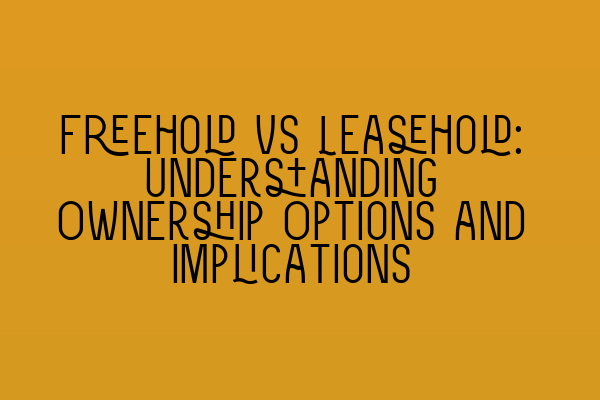Freehold vs Leasehold: Understanding Ownership Options and Implications
As you embark on your journey in property ownership, it is crucial to understand the different types of ownership options available to you. Freehold and leasehold are the two primary forms of property ownership, each with its own set of rights and responsibilities. In this blog post, we will delve into the key differences between freehold and leasehold and explore the implications of each option.
What is Freehold?
Freehold ownership grants you full ownership rights over the property and the land it sits on. When you own a property as a freeholder, you have the highest form of ownership available, giving you complete control and autonomy.
Key Benefits of Freehold Ownership:
1. Absolute Ownership: As a freeholder, you have the freedom to make decisions regarding your property without the need for permission from anyone else. You have complete control over its use, alteration, and development.
2. Investment Potential: Owning a freehold property can be a lucrative investment. You can maximize your returns by renting out the property or selling it at a later stage.
3. Reduced Costs: Unlike leasehold properties, freehold properties do not require payment of ground rent or service charges, saving you money in the long run.
4. Legacy and Inheritance: Freehold ownership provides a sense of security, allowing you to pass the property down to future generations.
What is Leasehold?
Leasehold ownership, on the other hand, means that you have the right to occupy and use the property for a fixed period of time, as specified in the lease agreement. The lease is a legally binding contract between the leaseholder (you) and the landlord (freeholder).
Key Features of Leasehold Ownership:
1. Limited Ownership: As a leaseholder, you hold the property on a lease for a specific period, typically ranging from 99 to 999 years. Once the lease term expires, the property reverts back to the freeholder.
2. Ground Rent and Service Charges: Leasehold properties often require payment of ground rent and service charges to the freeholder. Ground rent is a periodic payment made by the leaseholder to the freeholder. Service charges cover the costs of maintaining and managing communal areas within the property.
3. Restrictions and Regulations: Leasehold properties are subject to certain restrictions and regulations outlined in the lease agreement. These may include restrictions on alterations, subletting, and pet ownership.
4. Lease Extension and Enfranchisement: Leaseholders have rights to extend their lease term or collectively purchase the freehold through a process called lease extension or lease enfranchisement. These options provide leaseholders with more control over their property.
Implications and Considerations
When deciding between freehold and leasehold ownership, several factors should be considered:
1. Lifestyle and Future Plans: If you value complete autonomy and plan to make significant modifications to the property, freehold ownership may be the better option. However, if you are looking for a temporary or investment property, leasehold ownership could be more suitable.
2. Financial Considerations: In addition to the purchase price, you must consider the costs associated with ground rent and service charges for leasehold properties. These ongoing expenses can differ significantly depending on the terms outlined in the lease agreement.
3. Legal and Professional Advice: It is crucial to seek the advice of a qualified solicitor with expertise in property law to fully understand the implications and intricacies of both freehold and leasehold ownership before making a decision.
Conclusion
In summary, freehold and leasehold are two distinct forms of property ownership, each with its own advantages and implications. Understanding the key differences and considering various factors will help you make an informed decision when purchasing a property.
At SQE Property Law & Land Law, our team of solicitors provides expert advice on property ownership, lease agreements, and other legal matters relating to property. We are here to guide you through the intricacies of freehold and leasehold ownership to ensure a smooth and successful property transaction.
If you are preparing for your SQE exams, check out our related articles on SQE 1 Practice Exam Questions, SQE 1 Practice Mocks FLK1 FLK2, SQE 2 Preparation Courses, SQE 1 Preparation Courses, and SRA SQE Exam Dates to enhance your study and exam preparation.
For more information or to consult with our experienced solicitors, please visit our website or contact us today.
